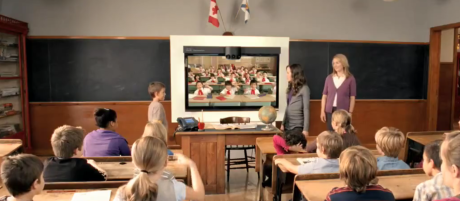Tech cannot replace the traditional schooling experience

For once, I'm not talking necessarily about universities and college education, where things are a little different. Instead I'm talking about the 'school experience' of K-12, which forms a vital part of primary and secondary socialisation and the level basics of education for today's youth.
Cisco's new commercial with Ellen Page shows a classroom full of kids on a 'field trip' to China using TelePresence, the company's video conferencing technology.

Scott Raymond, newbie Tech Broiler considers the benefits of this, while questioning the point or the need for traditional classrooms, in that:
"Geographic, cultural and economic barriers would no longer be an obstacle to getting a good education. The internet is one of the great levelers [sic] for communication. Why can’t it be one for education as well?"
Theory and practice are two very different things. The problems will soon mount up, and for once, technology has very little to do with it.
For pupils and students who are on sick leave, or need to spend time away from the classroom but still want to participate in lessons, technology can help bridge this divide. Those in rural areas who still struggle to get a basic Internet connection are automatically ruled out as this would not be possible. The introduction of WiMAX across the United States will give many rural homes the chance to access high-speed Internet, however.
School is not just about academic education; it is where the child or young person develops personally, their attitudes and constructs, their opinions and values and the harsh lessons of life. Schools have adapted themselves to take into account the non-curriculum factors such as home life, welfare issues and medical inconveniences which means the child struggles or suffers in a way where intervention is necessary.
School to many children is a safe haven, a place where they can be to escape from home life or the troubles they face within their home community. My father who works in education at a UK-equivalent K-12 level in an inner-city school can face more non-academic issues than learning related concerns in a standard working day.
Technology in this case acts as yet another barrier between the school and the child, meaning the issues that the child faces and needs help with become increasingly undetected as the social barrier between staff and student is restricted.
One comment in reply of Raymond's post negates anything I and he said. The practical reasons of being at home as a K-12 student while their parents are away at work is irresponsible and in some cases, illegal. Schools exist for a reason because it's like 'daycare' while the parents are at work, with a silver lining of guaranteed education.
I know this may not appear to be a widely held Generation Y view, but to suggest as Raymond did to completely rule out the physical entity of school as we know it would be massively detrimental to the Generation Z. The social consequences would be massive.
Technology can be a use for good, in the video for example where two schools and cultures are bridged together though thousands of miles apart.
"Everybody wins", says Raymond. Everybody that is the kids, who are the ones who need to win considering it is their school experience, and nobody else's.